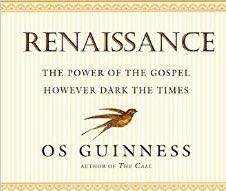Renaissance: The Power of the Gospel However Dark the Times (Os Guinness, 2014)

Believing the Gospel We Claim to Believe
I think it is safe to say that nobody in the church in the West thinks we have arrived, that things are fine as they are, and that they’ll only improve if we stay the course. We may point to different signs of trouble, challenge and decay, but we can all point to something, and regularly do. Something is wrong, we’d like to be part of the solution if for no other reason than to live a personally meaningful life, but the path ahead seems unclear. There are movements, and myriad voices of pundits and preachers, but for many of us all of that produces far more clamor than clarity.
Os Guinness suggests that to find our way forward we must first go back. For Christians this means we must go back to the gospel and ask whether we truly believe it and live it.
The first problem with this, of course, is that there is a great deal of confusion among Christians today as to what the “gospel” consists of. Revivalism has reduced the richness of the full-orbed gospel of the kingdom under Christ’s Lordship in creation, fall, redemption and restoration to a tract sized ditty, you are a sinner, Jesus died for you, you can be forgiven. The second problem is that in an age of disbelief, it can be hard for believers to comprehend the holy spirited power of the gospel to transform lives and change cultures. Guinness sums up a third problem this way:
We are in the age of gargantuan numbers, truly instant information, ceaselessly hyperactive social media, when the World Wide Web has become a flood-driven Niagara of raw, uninterpreted information and emotion that pounds down on us by the minute with its ceaseless roar and its drenching deluge. Who can hear themselves think, let alone make sense of it all with genuine reflection and seasoned judgment?
No wonder it is tempting to give up and go with the flow, rushing along with the crowds and sweeping past the best as we chase after the most. It is all too easy to get caught up in the sensational and forget the significant. (p. 41-41)
It is into this moment of our history, when the West seems to have lost its way and its moorings and the church in the West has been corrupted and made irrelevant, that Guinness offers us Renaissance: The Power of the Gospel However Dark the Times. Renaissance is brief and insightful, clear and logical, thoughtful and imaginative, Guinness is superbly gifted in writing prose that summarizes complex ideas accessibly and prompts reflection and begs for discussion. And he includes a lovely prayer and thoughtful discussion questions at the end of each chapter to help us process and personalize the ideas.
This is not a melancholy book, though Guinness insists we see the reality of the decay in church and culture with a clarity that is at times painful. It is an intensely hopeful book, because the decay has not weakened or made the gospel obsolete, and it is the gospel that is primary, and God’s power in the gospel that is foundational. This is a vision that calls for each believer to concentrate on being faithful in the ordinary of their life, whatever that ordinary is, while trusting God for the bigger picture. It is, Guinness says, “when followers of Jesus live out the gospel in the world, as we are called to do, we become an incarnation of the truth of the gospel and an expression of the character and shape of its truth. It is this living-in-truth that proves culturally powerful.” (p. 75)
I recommend Renaissance as must reading for every Christian in the West. I found it convicting, enlightening, and encouraging. It helped me think through what I understand as the gospel, review my commitment to it, and reflect on what it means to believe it so thoroughly that it shapes my life, my work, my relationships, and my engagement with culture under Christ’s Lordship.

